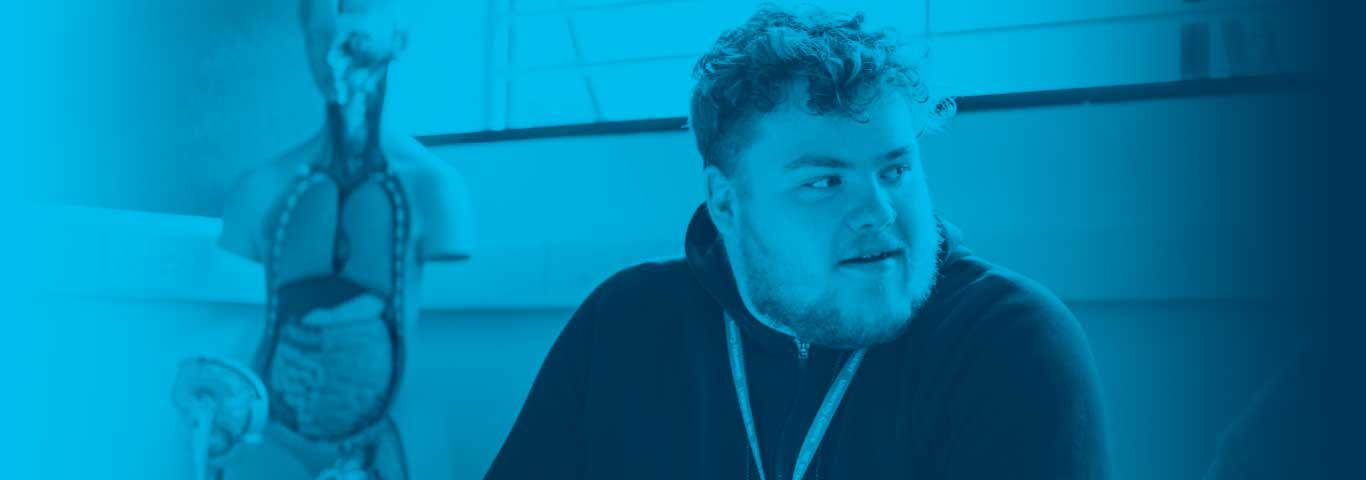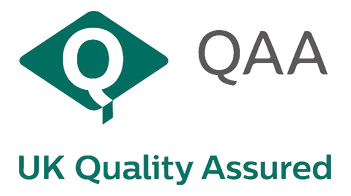Access your Prospectus
Want to find out more about the wide range of courses, student support and more available for students at University Centre Leeds?
Access your University Centre Leeds Prospectus now.

This two-year, foundation degree will provide you with required skills and behaviours. You will gain the training and experience needed to be proficient in the day-to-day role of an assistant practitioner including assisting in patient assessment, coordinating care, carrying out referrals and undertaking clinical, diagnostic and therapeutic interventions for the local population and care services. This course will guide and enhance your knowledge of this role and the requirements outlined by the occupational standards.
HTQ – Become a Healthcare Assistant Practitioner
This foundation degree is a Higher Technical Qualification (HTQ). This means it will give you the technical skills and training to move into a Healthcare Assistant Practitioner role.
TYPICAL OFFER
UCAS Tariff Points: 48 UCAS tariff points from two A-levels (or equivalent qualifications), one of which must be in a relevant subject
A Levels: 2 x D grades one of which to be in a relevant subject
BTEC L3 Diploma or Extended Diploma: MP, MPP grade in relevant subjects
Access to HE Diploma: Overall pass with 60 credits, with 24 credits to be at a Merit grade in a relevant subject
T Levels: Acceptable in a relevant subject
GCSE English: English Language grade 4 or above. Key Skills Level 2, Functional Skills Level 2 and the Certificate in Adult Literacy are accepted in place of GCSEs.
GCSE Maths: Maths grade 4 or equivalent. Key Skills Level 2, Functional Skills Level 2 and the Certificate in Adult Numeracy are accepted in place of GCSEs.
IELTS: IELTS 6.0 with no less than 5.5 in any component.
International qualifications: International qualifications will be assessed against these criteria.
Mature applicants: University Centre Leeds welcomes applications from mature* applicants who may not have met the academic criteria, but who can demonstrate a wealth of experience in their chosen field. Candidates in this category and otherwise are likely to be interviewed to assess their suitability for the course and may be asked to provide a portfolio of evidence to support their application.
*21 years and over at the start of the course
RPL claims: The course structure actively supports claims for Recognition of Prior Certified Learning (RPCL) or Recognition of Prior Experiential Learning (RPEL)
Part Time: Students for part time study are required to hold a full level 3 qualification or the equivalent experience in a relevant subject and will need to be working in the sector.
Interviews: A successful interview is required
References: An appropriate reference is required.
Placements: Full time students will need approx.10-12 hours a week, voluntary or paid placement in a suitable placement on-going throughout their study.
DBS checks: Students will also be required to complete the Disclosure and Barring Service process (DBS) prior to commencement on placement.
By enrolling on this programme, you will be helping to address a growing need for care workers and practitioners within the NHS. The course offers a clinical and therapeutic focus, including applied practice and a theoretical underpinning in accordance with occupational standards governed by the NHS, Skills for Health and Health Education England. As such, you will participate in class-based learning and an extensive work placement (460 hours).
You will develop all the skills and capabilities required to be a competent practitioner and gain the confidence to administer high-quality care. Assistant practitioners must have personal qualities such as kindness and empathy and this course is ideal for anyone who is conscientious and possesses effective observational, communication, problem-solving and methodical skills. You will need to be able to follow complex instructions and procedures.
You will be provided realistic practice for developing your proficiency in patient care, through consistent simulation scenarios throughout the programme. You will be able to learn through trial and error, allowing you to make and correct your clinical errors without adverse consequence and so improving your capabilities to ensure you are ready for the workplace.
Our pre-programmed manikins are designed to train you in the care and management of a variety of patients providing you with deliberate clinical training. When a manikin is perceived as a patient, it provides you with a realistic experience of what it means to behave like a healthcare professional. Consequently, this realism allows you to practice and acquire relational, communicative, and collaborative skills. The experience of learning using a manikin can facilitate the development of your professional identity.
The programme is designed for students who have some healthcare experience and a healthcare qualification (usually at level 3, such as the NCFE CACHE Diploma in Healthcare Support).
This course is validated by Luminate Education Group


For full-time courses, if you have applied or intend to apply to any other higher education institution as well as University Centre Leeds, you'll need to apply through UCAS.
If you know you’ll be applying for a course at University Centre Leeds only, you can apply either using our Direct Application Form, or via UCAS.
Note: If you have already made an application via UCAS, or intend to, you must apply via UCAS and not direct.
To access your account again and complete your application, use the second link provided in your verification email.
Please Note: The 'Apply direct' link works for direct applications to this course only. For each course you wish to apply for, you will need to find the course on our website and use the ‘Apply direct’ button on the correct page for that course.
Over the course of the two year programme, you will study the following modules:
Year 1 (Level 4): 120 credits
Academic Research and Study Skills (20 credits)
Gain the transferable skills required for undergraduate study and professional practice.
Fundamentals of Health and the Human Body (20 credits)
Explore the concepts of health (both negative and positive aspects) and health promotion.
Communication and Interpersonal Skills (20 credits)
Develop communication and interpersonal skills in preparation for your role as an assistant practitioner in healthcare.
Clinical and Therapeutic Interventions in Healthcare (20 credits)
Investigate aspects of clinical practice, learning how to recognise signs and symptoms of pain and distress in service users and recommend appropriate actions. The module will focus on clinical, diagnostic and therapeutic interventions to promote health and wellbeing.
Developing Professional Practice (including care planning) – Work Placement (40 credits)
Develop workforce skills and understand the principles that are required for not only this particular role, but within the sector. The module will cultivate class-based theoretical knowledge and facilitate the application of this to professional practice in the workplace.
Year 2 (Level 5): 120 credits
Nutrition and Health (20 credits)
Focus on the role of nutrition in relation to body function and the impact nutrition has on wellbeing throughout all life stages.
Researching in Healthcare (20 credits)
Undertake research that focuses on an aspect of healthcare. Throughout this module you will explore and review data, draw upon findings and make recommendations for change.
Mental Health and Wellbeing for Care (20 credits)
Get an opportunity to investigate the history, importance and impact of mental health and wellbeing in individuals, whilst developing an awareness of professional practice in alignment with current workforce requirements.
Legal Aspects of Healthcare (20 credits)
Explore contemporary legal aspects of healthcare and the role of the healthcare professional in complying with these.
Continuing Professional Practice in Healthcare – Work Placement (40 credits)
Build upon the level 4 Developing Professional Practice module. Throughout this module, you will learn to critically reflect upon the professional skills required of an Assistant Practitioner and develop autonomy and independence to carry out this role effectively.
By the end of the programme you will be a well-rounded graduate who is a competent and job-ready assistant practitioner in the healthcare sector
The programme will enable you to develop the clinical, professional and employability skills listed below:
Communication of complex sensitive information using a variety of methods (verbal/non verbal) in a range of scenarios (multi-disciplinary, peers, colleagues, other agency staff)
You will experience excellent student facilities, a brand new sensory room and clinical resource classroom.
You will be provided with opportunities for placements, mentor training, CPD opportunities and guest lectures through the excellent links between the programme and the profession, working closely with Leeds Health and Care Academy, Health Education England and Leeds NHS Trusts.
University Centre Leeds is one of a few centres to be accredited to run Higher Technical Qualifications in the Health Sciences.
This Foundation Degree was written to embed the principles of work-related practice, and therefore, the assessment strategies used replicate the procedures expected upon qualification and entry into the profession.
At level 4 the assessment strategies support students with essential skills for the profession such as care planning, case studies, presentations (group and individual), action plans and report writing. These skills progress into level 5 once a more in-depth knowledge of the sector has been acquired and more challenging methods are included such as mock multi-disciplinary panel meetings, professional discussions, literature reviews, presentations, case studies and essays.
You will also create and develop an evidence based e-portfolio (containing development plans, best practice and evidence of mandatory competencies) through the professional practice modules and work placement hours (460 in total over the two year programme – it is advised that 50% of these hours (230) are obtained during year one).
The programme will be delivered at our University Centre campus, on site at collaborative NHS Trusts and through a blended learning model.
TYPICAL OFFER
UCAS Tariff Points: 48 UCAS tariff points from two A-levels (or equivalent qualifications), one of which must be in a relevant subject
A Levels: 2 x D grades one of which to be in a relevant subject
BTEC L3 Diploma or Extended Diploma: MP, MPP grade in relevant subjects
Access to HE Diploma: Overall pass with 60 credits, with 24 credits to be at a Merit grade in a relevant subject
T Levels: Acceptable in a relevant subject
GCSE English: English Language grade 4 or above. Key Skills Level 2, Functional Skills Level 2 and the Certificate in Adult Literacy are accepted in place of GCSEs.
GCSE Maths: Maths grade 4 or equivalent. Key Skills Level 2, Functional Skills Level 2 and the Certificate in Adult Numeracy are accepted in place of GCSEs.
IELTS: IELTS 6.0 with no less than 5.5 in any component.
International qualifications: International qualifications will be assessed against these criteria.
Mature applicants: University Centre Leeds welcomes applications from mature* applicants who may not have met the academic criteria, but who can demonstrate a wealth of experience in their chosen field. Candidates in this category and otherwise are likely to be interviewed to assess their suitability for the course and may be asked to provide a portfolio of evidence to support their application.
*21 years and over at the start of the course
RPL claims: The course structure actively supports claims for Recognition of Prior Certified Learning (RPCL) or Recognition of Prior Experiential Learning (RPEL)
Part Time: Students for part time study are required to hold a full level 3 qualification or the equivalent experience in a relevant subject and will need to be working in the sector.
Interviews: A successful interview is required
References: An appropriate reference is required.
Placements: Full time students will need approx.10-12 hours a week, voluntary or paid placement in a suitable placement on-going throughout their study.
DBS checks: Students will also be required to complete the Disclosure and Barring Service process (DBS) prior to commencement on placement.
On completion of this foundation degree you may choose to seek employment directly as an Assistant Practitioner, register or progress onto one of our Top-Up Degrees at University Centre Leeds or another institution.
Assistant practitioners can become members of the Royal College of Nursing (RCN) or the professional association for their speciality.
For the latest version of the programme specifications for this course please click here.
For the latest version of the course handbook for this course based at University Centre Leeds please click here.
For last years version of the course handbook for this course based at University Centre Leeds please click here.
For the latest version of the course handbook for this course based at Keighley College please click here.
Applications are open for 2025 entry.
To apply directly to study at University Centre Leeds as an international applicant, please see the direct apply link further up this page or visit our 'How to apply' page and complete the steps.
You can also apply through UCAS.
For more information please visit our 'How to apply' page.
Course fees for Undergraduates are £14,000 (GBP)
Scholarship available £3,000 (GBP) all courses.
For more information about fees and scholarships, please click here.
Please see our entry requirements page for additional requirements as an international student
International students will study 5 additional hours on top of the regular timetable.
For more information about visa and immigration, please click here.
Hear directly from our students at University Centre Leeds as they share their unique journeys, challenges, and achievements. In this video, they discuss what makes learning here special, from supportive tutors and hands-on learning experiences to the close-knit community that fuels their passion and ambitions.
Discover how University Centre Leeds has helped shape their confidence, skills, and career paths, bringing their goals within reach in a vibrant and supportive environment.
Our online and in-person Open Events give you a chance to hear from tutors, discover the range of student support available, and find out for yourself why University Centre Leeds has the highest rating for student satisfaction in the city (NSS 2024).
Open DaysWant to find out more about the wide range of courses, student support and more available for students at University Centre Leeds?
Access your University Centre Leeds Prospectus now.







